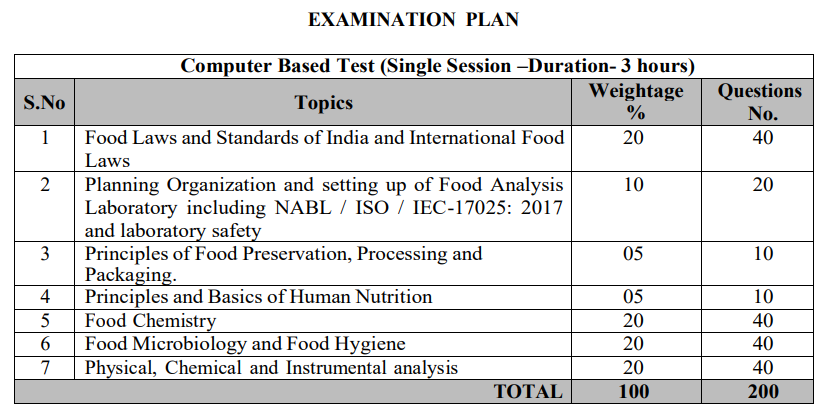FAE & JAE- (Food Analyst Examination) & (Junior Analyst Examination)
The Food Safety and Standards Authority of India looks after the manufacture, storage, distribution, sale & import of food so that safe food can be consumed. And it is the authority to conduct exam for the recruitment of Food Analyst and Junior Analyst.
August 16th 2023, 10:47:44 am | 5 min read

FAE (Food Analyst Examination) & JAE (Junior Analyst Examination)
About FSSAI- The Food Safety and Standards Authority of India looks after the manufacture, storage, distribution, sale & import of food so that safe food can be consumed.
FSSAI conducted 1st FAE in 2012 and 1st JAE in 2017
FSSAI conducting Food Analyst Examination (FAE) from 2012 to increase the pool of qualified Food Analysts and to augment human resource requirement of the primary/ referral laboratories notified by FSSAI.
From 2017 onwards, FSSAI is conducting Junior Analyst Examination (JAE) to create a pool of talented young professionals who will be a part of nation-wide food safety testing network.
6th JAE & 9th FAE will be conducted in 2023.
CRITERIA
6TH JUNIOR ANALYST EXAMINATION 2023 (6TH JAE – 2023)
9TH FOOD ANALYST EXAMINATION 2023 (9TH FAE- 2023)
Educational Qualification
Candidate should hold a Bachelor’s or Master’s or Doctorate degree in any of the following-
Chemistry/ Biochemistry/ Microbiology/ Dairy Chemistry/ Agriculture Science/ Animal Science/ Fisheries Science/ Biotechnology/ Food safety/ Food Technology, Food and Nutrition/ Dairy Technology/ Oil Technology/ Veterinary Sciences from an Indian university or is an associate of the Institution of Chemists (India).
Candidate should hold a Bachelor’s or Master’s or Doctorate degree in any of the following-
Chemistry/ Biochemistry/ Microbiology/ Dairy Chemistry/ Agriculture Science/ Animal Science/ Fisheries Science/ Biotechnology/ Food safety/ Food Technology, Food and Nutrition/ Dairy Technology/ Oil Technology/ Veterinary Sciences from an Indian university or is an associate of the Institution of Chemists (India).
Experience
No Experience
3 years or more experience in the analysis of food (in any ISO: 17025 accredited food testing laboratory/research institutions/ research laboratory).
After acquiring 3 years of experience, he/she may appear only in Practical Examination.
Reservation
No reservation
No reservation
Age Limit
No age limit
No age limit

The candidates who will qualify the Computer Based Test (CBT) of FAE-2023 will be eligible to appear for Practical Examination while the candidates of JAE-2023 will be awarded certificate as qualified Junior Analyst.
Question Type MCQ Exam Duration 3 hours Total no. of questions 200 Total Marks 800 Marking scheme A correct answer= plus 4 marks
An incorrect answer= minus 1 mark Percentage to qualify CBT (for both FAE & JAE) minimum 40%
Preparing for the Food Analyst Examination requires a thorough understanding of food analysis techniques, food safety regulations, and relevant scientific knowledge. Here are some tips to help you with your preparation:
Know the Exam Syllabus: Obtain the official syllabus for the Food Analyst Examination. Understand the topics and subjects that will be covered in the exam.
I. Study Food Analysis Techniques: Familiarize yourself with various food analysis methods, including chemical, microbiological, and instrumental techniques used to test food samples.
II. Food Safety and Regulations: Study the relevant food safety regulations and standards applicable in your country or region. Understand the legal aspects and requirements related to food analysis.
III. Study Materials and Resources: Gather textbooks, reference books, scientific journals, and online resources related to food analysis and food safety. Make sure to study from reputable sources.
IV. Mock Tests and Previous Year Papers: Solve mock tests and previous years' question papers to get acquainted with the exam pattern, question types, and difficulty level. This will help you practice time management and identify areas for improvement.
V. Laboratory Practice: If possible, gain practical experience in a food testing laboratory. Hands-on experience with food analysis techniques will reinforce your understanding and boost confidence.
VI. Understand Sampling Protocols: Learn about proper sampling procedures for different types of food products. Understanding the correct sampling methods is essential for accurate food analysis.
VII. Quality Control and Assurance: Study quality control and assurance procedures used in food analysis laboratories to ensure accurate and reliable results.
VIII. Stay Updated: Keep yourself updated with the latest advancements in food analysis techniques and any changes in food safety regulations.
IX. Join Study Groups: Consider joining study groups or forums where you can discuss concepts, share knowledge, and learn from others preparing for the same examination.
X. Revision and Practice: Regularly revise the topics you've studied and practice sample questions to reinforce your learning.
XI. Time Management: During the exam, manage your time wisely. Allocate sufficient time to each section based on its weightage and difficulty
XII. Stay Calm and Confident: On the day of the exam, stay calm and confident. Trust in your preparation and believe in your abilities.
Remember that the Food Analyst Examination & the Junior Analyst Examination evaluates your knowledge, skills, and understanding of food analysis. It's essential to have a strong foundation in the subject matter and be familiar with practical applications. With diligent preparation and a focused approach, you can excel in both the exams. Good luck!
.png&w=828&q=75)